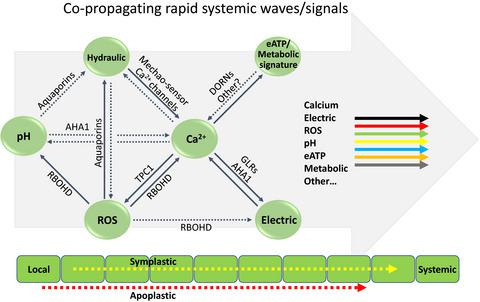Our official English website, www.x-mol.net, welcomes your
feedback! (Note: you will need to create a separate account there.)
Rapid systemic signaling during abiotic and biotic stresses: is the ROS wave master of all trades?
The Plant Journal ( IF 6.2 ) Pub Date : 2020-01-13 , DOI: 10.1111/tpj.14685 Yosef Fichman 1 , Ron Mittler 1
The Plant Journal ( IF 6.2 ) Pub Date : 2020-01-13 , DOI: 10.1111/tpj.14685 Yosef Fichman 1 , Ron Mittler 1
Affiliation

|
Rapidly communicating the perception of an abiotic stress event, wounding or pathogen infection, from its initial site of occurrence to the entire plant, i.e. rapid systemic signaling, is essential for successful plant acclimation and defense. Recent studies highlighted an important role for several rapid whole-plant systemic signals in mediating plant acclimation and defense during different abiotic and biotic stresses. These include calcium, reactive oxygen species (ROS), hydraulic and electric waves. Although the role of some of these signals in inducing and coordinating whole-plant systemic responses was demonstrated, many questions related to their mode of action, routes of propagation and integration remain unanswered. In addition, it is unclear how these signals convey specificity to the systemic response, and how are they integrated under conditions of stress combination. Here we highlight many of these questions, as well as provide a proposed model for systemic signal integration, focusing on the ROS wave.
中文翻译:

非生物和生物胁迫期间的快速系统性信号传导:ROS是所有行业的主导者吗?
从发生的最初位置到整个植物,快速传达对非生物胁迫事件,创伤或病原体感染的感知,即快速的系统信号传递,对于成功的植物适应和防御至关重要。最近的研究强调了几种快速的全植物系统信号在不同非生物和生物胁迫下介导植物适应和防御的重要作用。这些包括钙,活性氧(ROS),水力波和电波。尽管已证明了其中一些信号在诱导和协调全植物系统反应中的作用,但许多与它们的作用方式,传播途径和整合途径有关的问题仍未得到解答。此外,目前尚不清楚这些信号如何传达对全身反应的特异性,以及在压力组合条件下如何整合它们。在这里,我们重点介绍了许多这些问题,并提供了一个针对系统信号集成的建议模型,重点是ROS波。
更新日期:2020-01-13
中文翻译:

非生物和生物胁迫期间的快速系统性信号传导:ROS是所有行业的主导者吗?
从发生的最初位置到整个植物,快速传达对非生物胁迫事件,创伤或病原体感染的感知,即快速的系统信号传递,对于成功的植物适应和防御至关重要。最近的研究强调了几种快速的全植物系统信号在不同非生物和生物胁迫下介导植物适应和防御的重要作用。这些包括钙,活性氧(ROS),水力波和电波。尽管已证明了其中一些信号在诱导和协调全植物系统反应中的作用,但许多与它们的作用方式,传播途径和整合途径有关的问题仍未得到解答。此外,目前尚不清楚这些信号如何传达对全身反应的特异性,以及在压力组合条件下如何整合它们。在这里,我们重点介绍了许多这些问题,并提供了一个针对系统信号集成的建议模型,重点是ROS波。











































 京公网安备 11010802027423号
京公网安备 11010802027423号